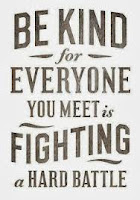Did you know the banana you eat is in danger?
One type of banana, the Cavendish, dominates the
global market. 95% of the N American
market consumes the Cavendish banana and a disease that could wipe it out
threatens it. That’s the problem with the
commercialization of fruit. Genetic
diversity is sacrificed for any type that will maximize productivity,
durability, & profit. If that
disease does take hold, goodbye Cavendish.
Will there be a ‘hello’ to a new type?
Perhaps, but it won’t come easy, or fast.
I was fascinated as I listened to a CBC documentary and further watched an (unlinked) episode by
David Suzuki, on the effort it takes to produce a new variety of banana (or ANY
fruit/vegetable). In the case of the
banana, it can take up to 10 years of experimentation,
testing, failing, and waiting for a new variety to be produced. Some people will work on these efforts and
never see the ‘fruit’ of their labour.
Got me thinking: If I
see a need for change, exactly how far ahead am I ready to commit myself?
We as leaders read all the time about ‘change’. However, we usually have the expectation that
the time window is months and at most a few years.
But 10 Years?
What if what you want to accomplish (and I think here
especially about social change) is way out there? Would you be ready to start towards something
you might never see finish? Other
cultures and generations of the past seemed to be able to think further down
the road than we do now in the Western world.
They thought generationally, often sacrificing their own comfort and
future for the sake of the next generation(s).
Others fought against social justice issues for decades before seeing
any change. Think of the 40 years
William Wilberforce battled entrenched slavery in England.
Can significant change happen if it is trapped in the
cultural expectation of “7 steps to…” or “40 days of…”?
For real, systemic change to occur I believe it will take:
- A conviction that change must occur.
- A decision that this is worth giving your life to implement.
- A readiness to set aside a lot of other short term, more immediately satisfying efforts to give attention to it.
- An ability to see life beyond today, tomorrow or even the next decade.
- A sense of the ‘rightness’ of what you are committing to do.
- A readiness to unselfishly & deliberately hand over your ‘project’ because you are OK being a prophet of a future that is not your own.
Harv Matchullis
Designer, Developer, Dreamer,
Devoted to things that matter.




